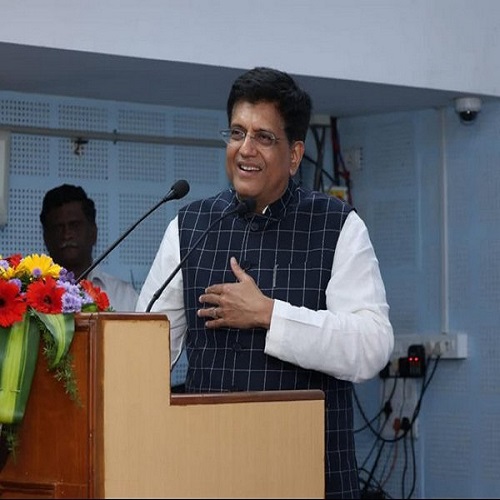SMART-PDS is a technological driven initiative and the need of hour, therefore, all the States/UTs should make earnest efforts to implement SMART-PDS at the earliest, said Shri Piyush Goyal, Union Minister of Consumer Affairs, Food and Public Distribution, Textiles and Commerce & Industries while addressing Conference of Food Ministers of all States/UTs.
The Union Minister emphasised on a transparent and accountable system urging to reduce human intervention and promote automation in the existing processes. He said transparency should be of utmost importance for free supply chain of foodgrains under Public Distribution System.
Shri Goyal appreciated Andhra Pradesh Command Control and stated that Central Government along with State Government will work together for implementing in other states also. On the Storage front, the Union Minister stated that Food Corporation of India (FCI) is upgrading their godowns into 5 star rated Godown and State Governments can also upgrade their godowns. With regard to settlement of pending claims of State Governments, he told that it is being done on priority basis and would be settled immediately.
The Union Minister also thanked all the Hon’ble Food Ministers of States, officers of States/UTs and officers of Department of Food and Public Distribution (DFPD) for taking out time to attend this conference. He further emphasised that all those present in the conference are providing service to poor and therefore we should do our job honestly so that the poor gets their entitled foodgrain timely.
In his remarks, Shri. Ashwini Kumar Choubey Hon’ble Minister of State for Consumer Affairs, Food and Public Distribution and Environment, Forest and Climate Change covered the major initiatives undertaken by the Government of India to strengthen the Public Distribution System in India. In particular, he highlighted the Pradhan Mantri Garib Kalyan Anna Yojana (PMGKAY) implemented from April 2020 to December 2022 during the COVID-19 pandemic in coordination with States & UTs and One Nation One Ration Card plan implemented to support migrant population. He also emphasized the importance of promoting millets in the PDS to further strengthen nutritional security in the country.
The Secretary, DFPD, Shri Sanjeev Chopra welcomed all the State Food Ministers, officers of States/UTs and officers of DFPD and briefed on the agenda items for the conference. He highlighted the efforts of Government of India to reduce the prices of wheat through OMSS, optimization of supply chain management, promotion of millets (Shree Anna), scaling up of rice fortification amongst others. He concluded by mentioning that the conference will lead to formulation of a roadmap for both the Centre and States/UTs in terms of food and public distribution.
This conference paves the way for bringing a renewed sense of progress and growth in the sector of food and public distribution. The Conference provided a platform to States/UTs to further their cause and acted as a catalyst in providing viable solutions to the problems faced by them. It also highlighted the achievements of States/UTs and thus motivated others to pave a progressive and innovative path.
During the conference issues related to Procurement of millets and its usage among beneficiaries of PMGKAY has been discussed. All the states have been urged to learn from the best practice of using millets in schemes like ICDS, mid-day meal and PDS in Karnataka which is helpful in adding nutrition and promoting healthy diet. The conference also deliberated on fighting anaemia and nutritional deficiencies in various parts of the country by suitably creating awareness on benefits of fortified rice. It may be noted that Phase II of the Rice Fortification is completed well ahead of target of 31st March, 2023 by covering all the 269 targeted rice consuming districts. The Phase III of the Rice fortification initiative will commence from 01st of April, 2023 with an aim to distribute fortified rice across all the districts except wheat consuming districts of the country by 31st March, 2024 in addition to ICDS, PM POSHAN and other welfare schemes. However, the Department is aiming to complete target by September 2023.
States were encouraged to procure more millets and coarse grains. All the State Governments were asked to open procurement centres for coarsegrains in producing districts, especially, in tribal areas. State Governments were asked to encourage consumption of coasregrains as well. The expected procurement of coarse grains/millets (Shri Anna) is 7.50 LMT during the KMS 2022-23(Kharif & Rabi) as against actual procurement of 6.30 LMT during KMS 2021-22. State Government of Karnataka will procure 6LMT millets (5 LMT Ragi and 1 LMT Jowar) in KMS 2022-23.
In order to ensure efficient and effective food security management system across the country, the best practice of foodgrain procurement in UP, route optimization by Punjab and auto grain analyzer by FCI have also been key highlights. States were further advised to implement more Minimum Threshold Parameters viz. linking of electricity consumption of mills with milled quantity of paddy and linking of vehicles used for transportation of foodgrain and their GPS tracking for efficiency & transparency by June, 2023.
During the first session of the conference, a meeting of State Food Secretaries and Food Corporation of India (FCI) under the chairmanship of Secretary DFPD was held to discuss the procurement arrangements for ensuing Rabi Marketing Season (RMS) 2023-24 and Rabi crop of Kharif Marketing Season (KMS) 2022-23.
A quantity of 341.50 LMT wheat has been estimated for procurement from 10 wheat procuring States during the forthcoming RMS 2023-24, which is much more than actual procurement of 187.92 LMT of wheat during previous RMS 2022-23. In this connection, it worth mentioning that Punjab, Haryana and Madhya Pradesh will move 25 LMT, 15 LMT and 20 LMT wheat respectively.
Also, a quantity of 106 LMT rice (rabi crop) has been estimated for procurement during the forthcoming rabi crop of current KMS 2022-23 from 11 rice (rabi crop) procuring States. States were advised to enhance milling capacity so that milling of one season gets completed before the commencement of next season and recycling of rice may be avoided.
It is expected that seamless procurement with direct transfer of money into farmer’s account, minimum cost of transportation and human interference free and quick analysis of foodgrains shall be a part of the ecosystem of Food Security Management very soon.
The auto grain analyzer based on Artificial Intelligence is able to process results in a minute with high accuracy for paddy, rice, wheat, Pulses, oil seeds and coarse grain. It has been certified by ICAR- CIPHET, Ludhiana. It involves minimize human intervention/error/biasness and saves time by giving digitally verifiable result of each grain.
The other issues related to smart PDS and One Nation One Ration Card for seamless delivery of foodgrains to migrant beneficiaries were also discussed. The best practice of command control centre by Andhra Pradesh for real time data on Procurement, storage, Quality and distribution of foodgrains was also discussed for which all states have been urged to learn and adopt the methods to make their systems effective and efficient.
The conference also discussed the issue of account finalization by foodgrain procuring states so that all pending payments are cleared in a time bound manner.
Further, implementation of additional minimum threshold parameters for online procurement operations, i.e. integration of power Validation of milled rice quantity with electricity consumption and Tracking of vehicles used for transporting food grains were also deliberated upon for improving efficiency & transparency in procurement operations.
During the discussion, it emerged that sufficient jute bags are available as per requirement of ensuing season. Issues related to finalization of audited accounts, food subsidy claims and rationalization of food subsidy was also deliberated upon. State Governments were requested to submit their pending bills to FCI and DFPD so that those can be settled in March, 2023.
(Source: PIB)














